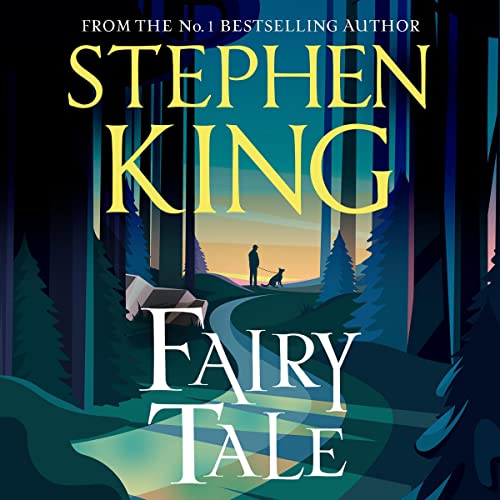Dive into Stephen King’s newest novel, “Fairy Tale.” PHOTO CREDIT: audible.com
Stephen King’s 81st piece of writing and 65th novel (and surely not his last), “Fairy Tale,” is an interesting piece of fiction from someone who seems to never run out of ideas.
The novel follows Charlie Reade, a 17-year-old who inherits keys to a hidden, otherworldly realm and finds himself leading the battle between forces of good and evil. And, as its title suggests, this otherworldly realm Empis seems to perfectly mirror the stories that Charlie has grown up with and the stories that all of us have grown up with.
In much the same way that King’s “Dark Tower” series blends different varieties of fantasy while including a fair amount of ideas that could only have come from the mind of King, “Fairy Tale” does the same with the childhood stories we all read about in one form or another. From monster giants to singing mermaids to nasty dwarfs while also having the patented King stamp on this story to make it his own. Whether that be a Cthulhu-esque Lovecraftian monster or a princess with no mouth who communicates through her horse, or a kingdom that may very well be a living creature of its own.
While the imagination on display is apparent and up to par with King’s usual output, as is the prose, “Fairy Tale” itself is perfectly average overall. For some, that may be a disappointment. For some, that may be expected. It all comes down to how you feel about Stephen King’s more recent works. It is a fun, adventurous experience that does not reinvent the wheel and will most likely help you pass a few weeks but not do much more than that. And as someone who has read 77 pieces of writing from King, I feel I have a fair amount of credibility on this topic.
“Fairy Tale” is a work that is made up of peaks and valleys, and for those of you who may be impatient, you might need to pick another King novel if you want something that gets right to the action. That spiral staircase you see on the cover is revealed to the reader and Charlie around 175 pages in.
From the beginning, I was interested in learning about our main character and his relationship with his parents was satisfying enough as its own little story before the larger-than-life aspects took over. Additionally, Charlie’s bond with the elderly curmudgeon Mr. Bowditch, a man he saves from potentially dying and who he looks after until he is back on his feet, is also a fairly captivating journey, the kind that King has always excelled at.
However, once the spiral staircase has been descended and Charlie makes his way into Empis for the first time with Radar, Mr. Bowditch’s elderly German Shepherd whose life Charlie is trying to save, is when it becomes apparent that King has given as much thought and planning to this novel as his other stories.
Charlie makes his way to the kingdom and the sundial that will make Radar young again while meeting what will later be integral characters along the way. This is one of the novel’s valleys. The characters are entertaining enough, and they help to inform us of the world we have entered and the evil that has overtaken it, but each character feels like one more glue trap keeping Charlie from the story the reader is actually interested in.
Once he makes it to the kingdom and the sundial, Charlie has to face an entirely new problem. Because of this, the story the reader thought they were getting shifts into something completely unexpected. This is where the novel begins to peak up again, as King sets up a few new characters who work with Charlie to accomplish their mutual goal.
King writes empathetic characters very well, and that strength, mixed with the situation Charlie and his comrades find themselves in, makes for a very interesting section of the novel. By the time we make it to the final act King has worked his magic and writes a bittersweet ending that makes you care for the characters more than you initially thought you did.
I disagree with certain King fans who state that King has not written anything of particular quality since his drug-fueled days. “11/22/63” was written in 2011 and is one of the best novels King has ever written, but I cannot argue that better works exist within King’s bibliography than “Fairy Tale.” It’s not bad; in all my years of reading King, I have learned that he is basically incapable of writing a bad novel, but it is not something that will stand the test of time the way some of his other works have.
King is still a master of the craft of writing at 75, and it is certainly on display in the novel. While reading the last few pages, I felt invested in the ending between Charlie and the kingdom of Empis.
That being said, overall, this would not be the first novel I would recommend to someone who wants to start reading King. As competent, creative and emotional as it can get, there are novels written by King that excel in all three of those departments better than “Fairy Tale.”
But that’s just my opinion as one of King’s thousands of constant readers. King is nothing if not polarizing. Check it out for yourself and see if you find this ode to fairy tales as immersive and engaging as the tales the story is based on.




